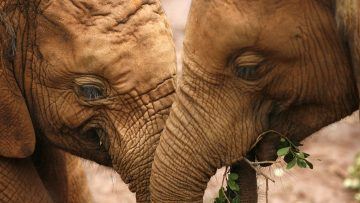Ed Yong in The Atlantic:
 In 2012, on a whim, Vincent Lynch decided to search the genome of the African elephant to see if it had extra anti-cancer genes. Cancers happen when cells build up mutations in their DNA that allow them to grow and divide uncontrollably. Bigger animals, whose bodies comprise more cells, should therefore have a higher risk of cancer. This is true within species: On average, taller humans are more likely to develop tumors than shorter ones, and bigger dogs have a higher cancer risk than smaller ones.
In 2012, on a whim, Vincent Lynch decided to search the genome of the African elephant to see if it had extra anti-cancer genes. Cancers happen when cells build up mutations in their DNA that allow them to grow and divide uncontrollably. Bigger animals, whose bodies comprise more cells, should therefore have a higher risk of cancer. This is true within species: On average, taller humans are more likely to develop tumors than shorter ones, and bigger dogs have a higher cancer risk than smaller ones.
But this trend breaks down when you look across species. Elephants are no more susceptible to tumors than Chihuahuas, and whales are no more likely to develop cancers than humans—if anything, their risk is lower. That’s especially strange because big animals also tend to have longer life spans, giving more opportunities for each of their already abundant cells to become cancerous. They ought to be walking (or swimming) masses of tumors—but clearly they aren’t. For the vast majority of mammals that have been studied, the odds of dying from cancer range from 1 to 10 percent, whether you’re talking about a 50-gram grass mouse or a 5,000-kilogram African elephant.
This puzzling trend is called Peto’s paradox, named after the British epidemiologist Richard Peto, who described it in the 1970s. Since then, biologists have proposed hundreds of hypotheses to explain it. Some note that larger animals have lower metabolic rates; this reduces the rate at which they acquire mutations. Others have suggested that in big animals, tumors need more time to reach a lethal size; during that time, the tumors likely to grow debilitating secondary tumors of their own.
More here.
